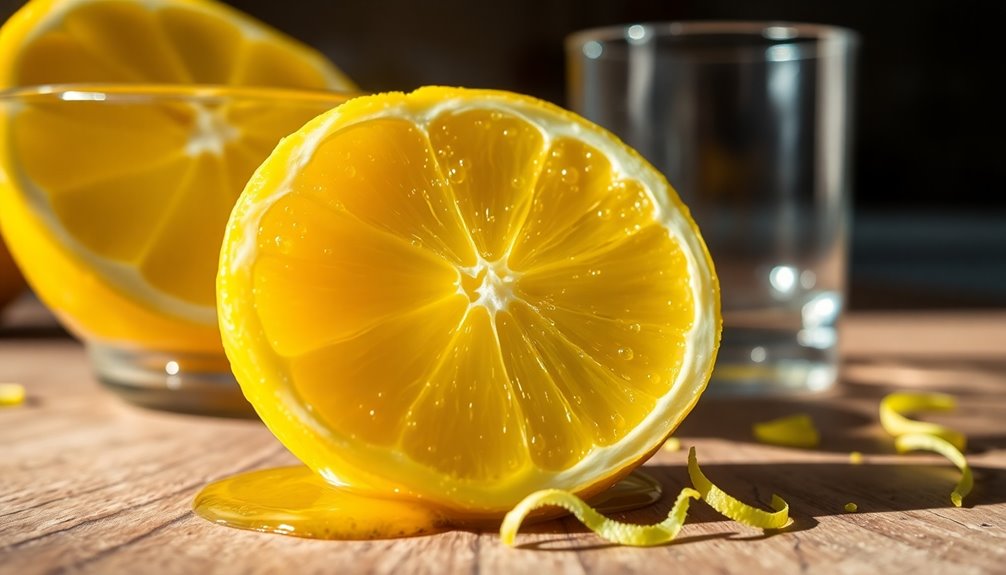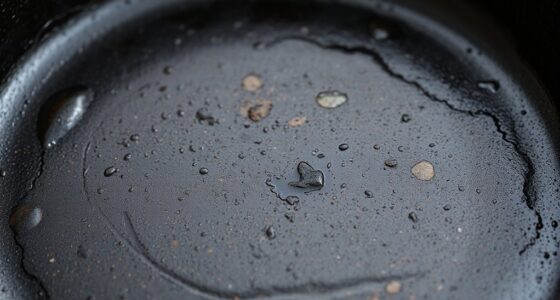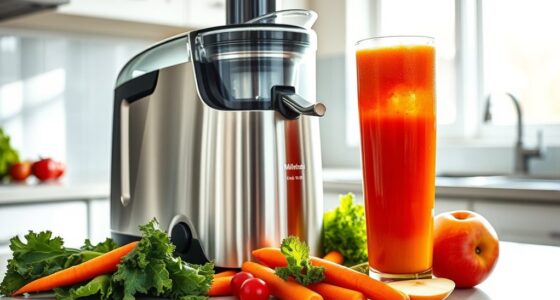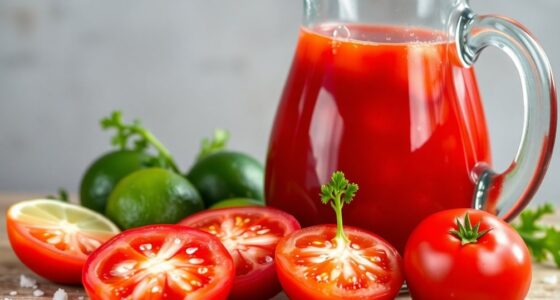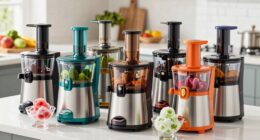A medium lemon typically gives you about 3 tablespoons of juice. If you're using a large lemon, you can get up to 4 tablespoons, while smaller ones usually produce around 2 tablespoons. Keep in mind that various factors like ripeness and lemon variety can affect these amounts. To make the most of your lemons, there are a few handy tips to maximize juice extraction. Stick around to discover more about choosing the right lemons for your recipes!
Key Takeaways
- A medium lemon yields about 3 tablespoons of juice, while a large lemon can produce up to 4 tablespoons.
- Smaller lemons typically yield around 2 tablespoons of juice.
- Approximately 5 to 6 medium lemons are needed for 1 cup of juice.
- Factors like ripeness and variety can influence the amount of juice extracted.
- Meyer lemons may yield slightly less juice but offer a sweeter flavor profile.

When you're wondering how much juice you can squeeze from one lemon, it's good to know that a medium lemon usually yields about 3 tablespoons. This amount of juice can be perfect for a variety of recipes, whether you're making a refreshing lemonade, adding a zesty kick to a dish, or crafting a unique salad dressing.
If you're using large lemons, you might be pleasantly surprised to find they can produce up to 4 tablespoons—about ¼ cup—of juice. On the flip side, smaller lemons may only give you around 2 tablespoons, so size matters when it comes to extracting juice.
If you need a cup of lemon juice, you'll want to plan ahead. Depending on the size and juiciness of your lemons, you'll typically need about 5 to 6 medium lemons or 4 large lemons. Keep in mind that the amount of juice can vary quite a bit based on factors like the lemon's ripeness, variety, and growing conditions.
For instance, a Meyer lemon, which is sweeter and less acidic than a regular lemon, can offer a slightly different yield.
To ensure you get the maximum amount of juice from your lemons, there are a few handy tricks you can try. Warming the lemon in the microwave for 10-20 seconds can help soften it up, making it easier to extract juice.
After warming, roll the lemon on a countertop or cutting board before cutting it open—this helps break down the internal membranes and releases even more juice. Using a citrus juicer can also make the process smoother, allowing you to get every last drop from the lemon.
When you're preparing to juice, don't forget to assess the type of lemon you're using. Meyer lemons, which are a hybrid between a lemon and a mandarin, offer a distinct flavor that can enhance your recipes.
If you decide to use these, keep in mind that they might yield slightly less juice than standard lemons, but their sweetness can make up for it in flavor.
Understanding how much juice you can expect from one lemon is essential, especially if you're following a recipe that requires precise measurements.
Whether you're whipping up a tangy marinade or a classic lemon meringue pie, knowing the yield can save you from any last-minute surprises.
So the next time you're at the store, consider the size of the lemons and what you plan to make. With a little practice and these tips in mind, you'll become a pro at extracting the perfect amount of lemon juice for all your cooking and baking needs.
Now, you'll always know how much juice to expect from your lemons!
Frequently Asked Questions
How Much of Bottled Lemon Juice Is Equal to One Lemon?
When you need to substitute bottled lemon juice for fresh lemon juice, use about 2-3 tablespoons to equal one lemon.
Keep in mind that bottled juice can be more concentrated, so you might want to taste and adjust the amount based on your dish.
Always check the label for any preservatives, as these can alter the flavor.
Fresh juice generally offers a brighter taste, so consider that when making your choice.
How Much Juice for 1 Lemon?
Imagine the refreshing burst of citrus flavor that brightens your dish!
When you squeeze a lemon, you typically get about 2 to 3 tablespoons of juice from a medium-sized fruit. If you choose a larger lemon, you might even extract up to 4 tablespoons.
Remember, the juiciness varies, so don't be surprised if you get more from a particularly ripe lemon.
Just roll it on a surface before cutting to maximize that liquid gold!
How Much Are 2 Lemons Juiced?
When you juice two lemons, you can expect varying yields based on their size.
If they're medium, you'll get about 6 tablespoons, while large lemons might give you around ½ cup or 8 tablespoons.
Small lemons, on the other hand, usually produce about 4 tablespoons together.
To get the best flavor in your recipes, it's a good idea to measure the juice, as personal taste can vary greatly.
Can I Substitute Bottled Lemon Juice for Fresh Lemon Juice?
Think of your recipes as a garden, where fresh lemon juice is the vibrant sun that brings everything to life.
You can substitute bottled lemon juice for fresh, but keep in mind that it's like trading sunlight for cloudy skies. While it's convenient, the flavor mightn't shine as bright.
Stick to a 1:1 ratio, but be ready to adjust based on your taste. Fresh juice often adds the sparkle that bottled varieties can lack.
Conclusion
When you squeeze one lemon, you typically get about 2 to 3 tablespoons of juice. Imagine whipping up a refreshing lemonade for a hot summer day with just one lemon. You zest it, squeeze it, and combine that bright juice with sugar and water. Suddenly, you’ve crafted a tasty drink that everyone loves, all from a single fruit! So, next time you reach for a lemon, remember how much flavor you can unlock from just one! Not only can one lemon elevate your beverage game, but it also adds a delightful twist to various dishes, from dressings to marinades. It’s amazing to consider how much juice in one lemon can transform an ordinary meal into a culinary masterpiece. So, keep that citrus fruit handy, and let its zesty brightness inspire your cooking adventures!
Cindy thoroughly researches juicing trends, techniques, and recipes to provide readers with practical advice and inspiration. Her writing style is accessible, engaging, and designed to make complex concepts easy to understand. Cindy’s dedication to promoting the advantages of juicing shines through her work, empowering readers to make positive changes in their lives through the simple act of juicing.

